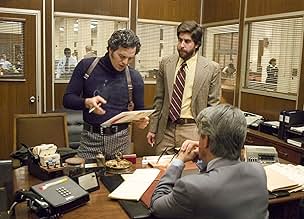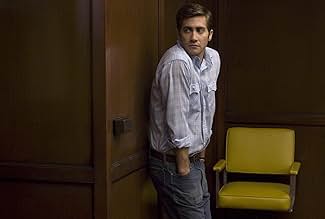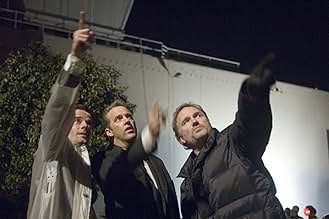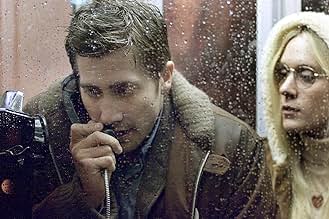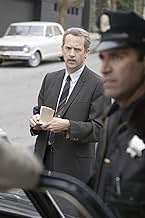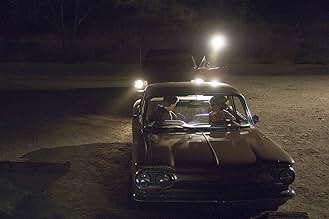Zodiac
Entre 1968 et 1983, un dessinateur de San Francisco devient un détective amateur, obsédé par la traque du Tueur du Zodiaque, un individu non identifié qui terrorise et se déchaîne sur la Cal... Tout lireEntre 1968 et 1983, un dessinateur de San Francisco devient un détective amateur, obsédé par la traque du Tueur du Zodiaque, un individu non identifié qui terrorise et se déchaîne sur la Californie du nord.Entre 1968 et 1983, un dessinateur de San Francisco devient un détective amateur, obsédé par la traque du Tueur du Zodiaque, un individu non identifié qui terrorise et se déchaîne sur la Californie du nord.
- Réalisation
- Scénario
- Casting principal
- Récompenses
- 3 victoires et 71 nominations au total
June Diane Raphael
- Mrs. Toschi
- (as June Raphael)
Avis à la une
This is a movie about process. It's about what happens when a case goes cold and simple answers don't suffice. It's a risk taken when one does a fictional presentation of an historical event from fairly recent times. You can stick tot he facts or simply make things up. I enjoyed this film because the three principle characters were real and human. All were in over their heads to some extent. Jake Gyllenhaal character makes that sometimes unfortunate serendipitous discovery and becomes obsessed. The police have done what they can, but without passion and this is what Gyllenhaal's character brings to the game. Unfortunately, so much time has passed and so much has gone cold. So everything is based on circumstance. We must content ourselves with what we find and give up on confessions or witnesses. I knew from the start what the case was about and I recommend that those sourpusses that complain about this film do a little reading (maybe one paragraph on Wikipedia which should handle your attention spans) and then decide whether you want to bother with this. Personally, I thought the acting was superb and it painted a picture of the frustration with trying to solve a case with only bits and pieces.
"Zodiac" may frustrate viewers who come to David Fincher's latest film expecting a traditional serial killer thriller. The film begins with a couple of hair-raising and rather brutal recreations of murders carried out by the mysterious killer who terrorized the San Francisco Bay area in the late 1960s and early 1970s. These early scenes are shocking and, compared to the rest of the film, disorienting, because they offer the only time that we come close to seeing events from the killer's perspective. As the film progresses, the Zodiac killer himself fades into the background, and the movie turns into a meticulous and engrossing document of the investigation to track him down, an investigation that includes countless blind alleys and false clues and which to this day has not reached a conclusion. I would be more prone to label the somewhat rambling screenplay as sloppy storytelling if I did not feel that Fincher tells the story exactly as he wants to. The elusive narrative works, because the film is about an elusive villain.
Jake Gyllenhaal plays Robert Graysmith, a cartoonist working for the "San Francisco Chronicle" at the time the Zodiac killer began his gruesome work. He becomes fascinated by the case, and takes it on as a sort of morbid personal hobby long after the police department has given it up as a lost cause. Graysmith eventually wrote the book on which this film is based, and according to his accounts, he discovered enough evidence about one of the suspects in the case to put the police back on his trail years after he'd been cleared for lack of evidence. Other characters come and go. Robert Downey, Jr. does characteristically terrific work as a reporter at the "Chronicle" who grabs his own portion of notoriety through his involvement in the case. Mark Ruffalo and Anthony Edwards play the two detectives in charge of the investigation. Chloe Sevigny plays Gyllenhaal's put-upon wife, who gradually loses her husband to his obsession. All of the actors deliver thrilling performances, many of them against the odds. Since this isn't a character driven movie, many of the characters remain undeveloped, but not, for once, to the detriment of the film. This story isn't about the people involved, but rather about their role in the Zodiac saga; once they've served their purpose, Fincher dispenses with them. Ironically, a film that clocks in at nearly 3 hours exhibits a great deal of narrative economy.
Parts of "Zodiac" are intensely creepy. Fincher effectively uses the rainy San Francisco atmosphere to its maximum potential, and the grimy browns and grays of the production design call to mind Fincher's other well-known films, like "Seven" and "Fight Club." But "Zodiac" is much more grown up than those films, and for an audience to enjoy it, it has to have an attention span. Long scenes are given to analyzing handwriting samples, recreating the scenes of murders, digging through newspaper clippings and files. You can tell that Fincher is fascinated by police work in the pre-CSI era, when fax machines were still a novel invention. He delves into the investigative process with a nearly fetishistic attention to detail, but he makes all of it endlessly mesmerizing. He does his best to bring everything to some sort of conclusion, but the real-life end to the story makes a complete conclusion impossible. This film is more about the journey than the destination, and what a journey it is.
Grade: A
Jake Gyllenhaal plays Robert Graysmith, a cartoonist working for the "San Francisco Chronicle" at the time the Zodiac killer began his gruesome work. He becomes fascinated by the case, and takes it on as a sort of morbid personal hobby long after the police department has given it up as a lost cause. Graysmith eventually wrote the book on which this film is based, and according to his accounts, he discovered enough evidence about one of the suspects in the case to put the police back on his trail years after he'd been cleared for lack of evidence. Other characters come and go. Robert Downey, Jr. does characteristically terrific work as a reporter at the "Chronicle" who grabs his own portion of notoriety through his involvement in the case. Mark Ruffalo and Anthony Edwards play the two detectives in charge of the investigation. Chloe Sevigny plays Gyllenhaal's put-upon wife, who gradually loses her husband to his obsession. All of the actors deliver thrilling performances, many of them against the odds. Since this isn't a character driven movie, many of the characters remain undeveloped, but not, for once, to the detriment of the film. This story isn't about the people involved, but rather about their role in the Zodiac saga; once they've served their purpose, Fincher dispenses with them. Ironically, a film that clocks in at nearly 3 hours exhibits a great deal of narrative economy.
Parts of "Zodiac" are intensely creepy. Fincher effectively uses the rainy San Francisco atmosphere to its maximum potential, and the grimy browns and grays of the production design call to mind Fincher's other well-known films, like "Seven" and "Fight Club." But "Zodiac" is much more grown up than those films, and for an audience to enjoy it, it has to have an attention span. Long scenes are given to analyzing handwriting samples, recreating the scenes of murders, digging through newspaper clippings and files. You can tell that Fincher is fascinated by police work in the pre-CSI era, when fax machines were still a novel invention. He delves into the investigative process with a nearly fetishistic attention to detail, but he makes all of it endlessly mesmerizing. He does his best to bring everything to some sort of conclusion, but the real-life end to the story makes a complete conclusion impossible. This film is more about the journey than the destination, and what a journey it is.
Grade: A
*This comment may contain spoilers, but I tried to be as vague as possible, and I think that this movie actually improves if you more or less know the ending.*
When David Fincher's ZODIAC opens with the year "1969" on the screen, a colorful wide angle shot of California, and a song from "Hair" on the soundtrack, we think we know what we are in for: an atmospheric historical epic. Then the film's first murder happens, and we are at the San Francisco chronicle with Jake Gyllenhall and Robert Downey, Jr., just recognizable enough under their period garb.
We see three other murders or almost-murders within the first 1 1/2 hours of this 2 1/2 hour movie, and they are terrifying in a way that few movie murders are: this is one of the only movies that succeeds at making you identify with the victims, and the murder scenes contain enough gore to be convincing but not so much gore that it becomes its own aesthetic, as in other Fincher films.
But ZODIAC is so long that eventually, the murders fail to keep our attention. The movie makes so many leaps through time and recounts so many investigations that lead nowhere, it is easy to forget that it began as an exciting movie.
One could easily argue that the movie has a right to be so uneventful because it is a "realistic" reflection of police procedure and of, well, reality. It is, but one can't help but think, With all the time-lapsing that goes on (it constantly jumps months ahead in the late '60s and early '70s, and then jumps from '73 to '77 to '83 to '91), why couldn't it skip more boring parts? The movie manages to be both too truncated and too thorough.
On a positive note, the digital cinematography by Harris Savides gives the film a consistently interesting look, which is something that many better movies don't have. He gives the film the signature "Fincher" look: saturated pastels in the daytime and a vague yellow-green tint at night. The movie is visually interesting without being calling too much attention to itself, but it's a shame that there's not enough to watch. The actors are sufficient, but the movie has no protagonist and we don't get to know anyone well enough - not even Robert Graysmith (Jake Gyllenhall), who becomes the de facto main character half way through.
The friendship between Graysmith and Paul Avery (Robert Downey, Jr.) - particularly a bar scene in which Graysmith introduces Avery to the merits of girly drinks - is interesting enough, but when Avery ceases to be a major character, we don't get enough of an indication that Graysmith has a life outside of his obsession with the Zodiac case. That may have been the point, but it doesn't work: there is nothing wrong with a plot that goes nowhere if the characters manage to hold our interest, but they don't hold our interest for all 2 1/2 hours, and the movie itself seems to lose interest in Graysmith towards the end. ZODIAC has no pay-off, which wouldn't be a problem if it weren't such a plot-driven film.
Still, it has its moments that nearly redeem it. It's a bit like a friend who tells long and meandering but enthusiastic stories: once you realize that his stories will always be too long, you can focus on the better parts. But his stories are still too long.
When David Fincher's ZODIAC opens with the year "1969" on the screen, a colorful wide angle shot of California, and a song from "Hair" on the soundtrack, we think we know what we are in for: an atmospheric historical epic. Then the film's first murder happens, and we are at the San Francisco chronicle with Jake Gyllenhall and Robert Downey, Jr., just recognizable enough under their period garb.
We see three other murders or almost-murders within the first 1 1/2 hours of this 2 1/2 hour movie, and they are terrifying in a way that few movie murders are: this is one of the only movies that succeeds at making you identify with the victims, and the murder scenes contain enough gore to be convincing but not so much gore that it becomes its own aesthetic, as in other Fincher films.
But ZODIAC is so long that eventually, the murders fail to keep our attention. The movie makes so many leaps through time and recounts so many investigations that lead nowhere, it is easy to forget that it began as an exciting movie.
One could easily argue that the movie has a right to be so uneventful because it is a "realistic" reflection of police procedure and of, well, reality. It is, but one can't help but think, With all the time-lapsing that goes on (it constantly jumps months ahead in the late '60s and early '70s, and then jumps from '73 to '77 to '83 to '91), why couldn't it skip more boring parts? The movie manages to be both too truncated and too thorough.
On a positive note, the digital cinematography by Harris Savides gives the film a consistently interesting look, which is something that many better movies don't have. He gives the film the signature "Fincher" look: saturated pastels in the daytime and a vague yellow-green tint at night. The movie is visually interesting without being calling too much attention to itself, but it's a shame that there's not enough to watch. The actors are sufficient, but the movie has no protagonist and we don't get to know anyone well enough - not even Robert Graysmith (Jake Gyllenhall), who becomes the de facto main character half way through.
The friendship between Graysmith and Paul Avery (Robert Downey, Jr.) - particularly a bar scene in which Graysmith introduces Avery to the merits of girly drinks - is interesting enough, but when Avery ceases to be a major character, we don't get enough of an indication that Graysmith has a life outside of his obsession with the Zodiac case. That may have been the point, but it doesn't work: there is nothing wrong with a plot that goes nowhere if the characters manage to hold our interest, but they don't hold our interest for all 2 1/2 hours, and the movie itself seems to lose interest in Graysmith towards the end. ZODIAC has no pay-off, which wouldn't be a problem if it weren't such a plot-driven film.
Still, it has its moments that nearly redeem it. It's a bit like a friend who tells long and meandering but enthusiastic stories: once you realize that his stories will always be too long, you can focus on the better parts. But his stories are still too long.
Usually when a film gets made about a media grabbing unsolved crime, the resulting movie tends to be overtly sensational and at best remotely connected to what really happened. Considering that director David Fincher's last film about a serial killer was the gripping but deeply disturbing Se7en, his take on the Zodiac killer almost seemed primed to be an extreme, nail-biting thriller.
Instead what he's given us is a well argued thesis on the possible identity of the Zodiac. While there are some very intense scenes, Fincher takes a somewhat unexpected approach on the subject. All of the killings take place pretty early on in the movie, with the bulk of the story centering on the actual investigation into the killer by both the cops and a cartoonist who becomes obsessed with the case. In fact, the depictions of the murders are done in a manner that is fairly reverent towards the victims while still conveying the cruelty of them.
Some people may find themselves disappointed by this two and a half hour epic if they go in expecting the usual serial killer fare. But it's a must see for any fan of Fincher's work, or anybody who likes a good detective story.
Instead what he's given us is a well argued thesis on the possible identity of the Zodiac. While there are some very intense scenes, Fincher takes a somewhat unexpected approach on the subject. All of the killings take place pretty early on in the movie, with the bulk of the story centering on the actual investigation into the killer by both the cops and a cartoonist who becomes obsessed with the case. In fact, the depictions of the murders are done in a manner that is fairly reverent towards the victims while still conveying the cruelty of them.
Some people may find themselves disappointed by this two and a half hour epic if they go in expecting the usual serial killer fare. But it's a must see for any fan of Fincher's work, or anybody who likes a good detective story.
I have been highly interested and engrossed in the Zodiac killer story for the last 5 years now and I can say, without doubt, that this is the best and most accurate telling of the story. The film presents numerous details that were unknown to me before seeing it. All of these facts and theories are thrown together in a way that strings the viewer along, you think it's someone, then you get new information and that person is no longer a suspect. Fincher really puts you into the life of a detective working on the case. You feel just as excited when new information comes about and are equally disappointed when it leads to another dead end.
The film is beautifully shot (on VIPER digital cameras) and once again, Fincher shows us his wonderfully adept skills with CGI shots. All of the actors shine and truly become their characters. Jake Gyllenhall and Robert Downey Jr. put in excellent performances, as does Mark Ruffalo. I was also pleasantly surprised to see Phillip Baker Hall join the ensemble.
The only complaint I have heard that holds any water is that the film is too long. At roughly 2 1/2 hours, I can see how many would think that is long, but you have to realize that this is an intricate story with deep characters who need to be examined and understood. A standard 90 minute film, or even a two hour cut, would not have been able to tell the story as well. Character motivation and important details would have been left on the cutting room floor.
If you have followed the Zodiac case, you will be happy to see how well done this movie is. If you don't know anything about the case, you will be given an excellent story that will make you want to learn more about it. Regardless, you should do yourself a favor and see this movie. If nothing else, it's better than "Wild Hogs".
The film is beautifully shot (on VIPER digital cameras) and once again, Fincher shows us his wonderfully adept skills with CGI shots. All of the actors shine and truly become their characters. Jake Gyllenhall and Robert Downey Jr. put in excellent performances, as does Mark Ruffalo. I was also pleasantly surprised to see Phillip Baker Hall join the ensemble.
The only complaint I have heard that holds any water is that the film is too long. At roughly 2 1/2 hours, I can see how many would think that is long, but you have to realize that this is an intricate story with deep characters who need to be examined and understood. A standard 90 minute film, or even a two hour cut, would not have been able to tell the story as well. Character motivation and important details would have been left on the cutting room floor.
If you have followed the Zodiac case, you will be happy to see how well done this movie is. If you don't know anything about the case, you will be given an excellent story that will make you want to learn more about it. Regardless, you should do yourself a favor and see this movie. If nothing else, it's better than "Wild Hogs".
Le saviez-vous
- AnecdotesThe murder victims' costumes were meticulously recreated from forensic evidence that was lent to the production.
- Gaffes(at around 52 mins) One of the books Robert Graysmith has in 1969 has a barcode on the back. Barcodes did not even exist in any stores until the summer of 1974, and most items did not contain barcodes for several years after that.
- Citations
Arthur Leigh Allen: I am not the Zodiac. And if I was, I certainly wouldn't tell you.
- Crédits fousThe end text reads as follows: Following Mike Mageau's identification of Arthur Leigh Allen, authorities scheduled a meeting to discuss charging him with the murders. Allen suffered a fatal heart attack before this meeting could take place. In 2002, a partial DNA profile, that did not match Allen, was developed from a 33 year-old Zodiac envelope. Investigators in San Francisco and Vallejo refused to rule out Allen as a suspect on the basis of this test. In 2004, the San Francisco Police Department deactivated their Zodiac investigation. Today, the case remains open in Napa County, Solano County, and in the city of Vallejo, where Arthur Leigh Allen is still the prime and only suspect. Inspector David Toschi retired from the San Francisco Police Department in 1989. He was cleared of all charges that he wrote the 1978 Zodiac letter. Paul Avery passed away on December 10, 2000 of pulmonary emphysema. He was 66. His Ashes were scattered by his family in the San Francisco Bay. Robert Graysmith lives in San Francisco and enjoys a healthy relationship with his children. He claims he has not received a single anonymous call since Allen's death.
- Versions alternativesThe director's cut contains approximately 5 minutes of new footage, including:
- Melvin Belli (Brian Cox) talks about his Safari trip (when the Zodiac letter came to his house)
- Toschi (Mark Ruffalo) introduces himself to the Riverside Police Chief
- A new scene between Graysmith (Jake Gyllenhaal) and Avery (Robert Downey Jr.)
- A three-way conversation laying Leigh as a suspect to get a search warrant
- Extended audio montage (over a black screen)
- Plus extra bits of dialogue
Meilleurs choix
Connectez-vous pour évaluer et suivre la liste de favoris afin de recevoir des recommandations personnalisées
Détails
Box-office
- Budget
- 65 000 000 $US (estimé)
- Montant brut aux États-Unis et au Canada
- 33 080 084 $US
- Week-end de sortie aux États-Unis et au Canada
- 13 395 610 $US
- 4 mars 2007
- Montant brut mondial
- 84 786 496 $US
- Durée2 heures 37 minutes
- Couleur
- Mixage
- Rapport de forme
- 2.39 : 1
Contribuer à cette page
Suggérer une modification ou ajouter du contenu manquant







